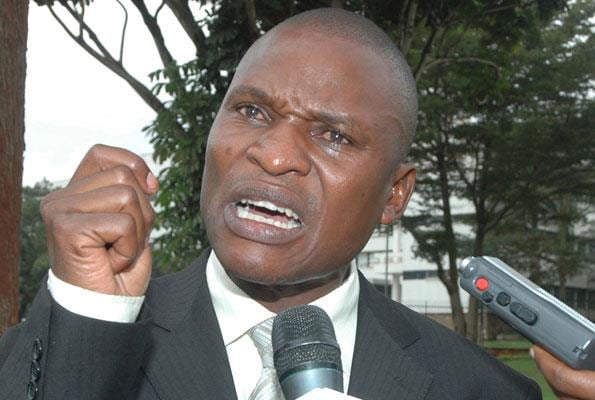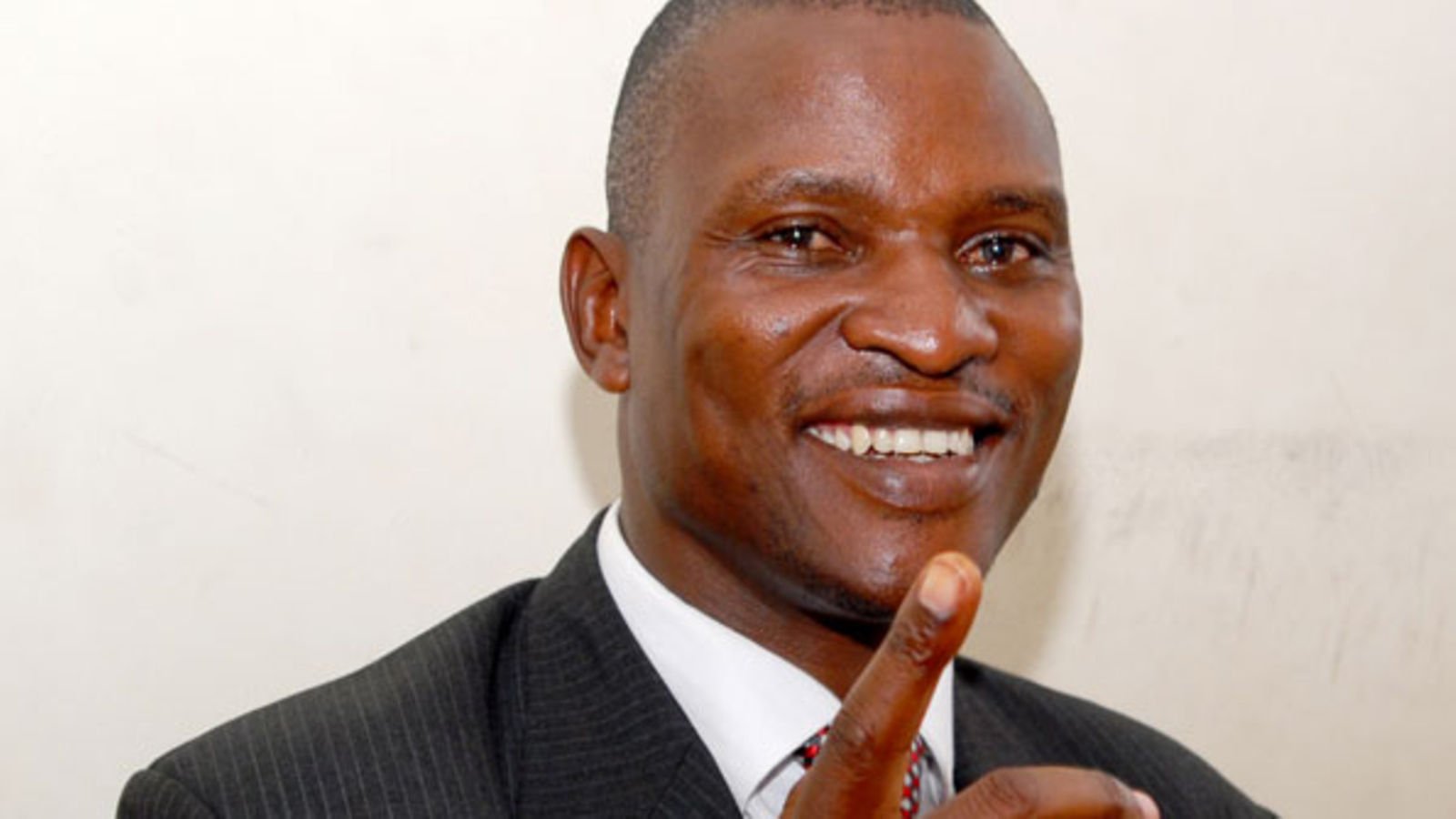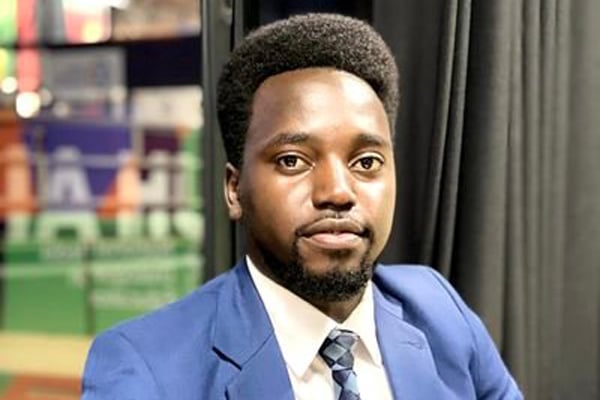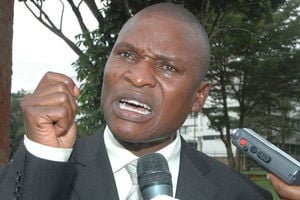
The late Joseph Tamale Mirundi during a press briefing at Uganda Media Centre. Photo | File
In the words of Joseph Tamale Mirundi Sr, “I consider myself very unique because…” a line that encapsulates the self-perception of a man who believed his uniqueness was evident from his early years.
In his book, Saving a Tongue from Its Hostile Teeth, Mirundi recounts speaking at just six months old, engaging in mature conversations, and making precise decisions—a claim that hints at his early intellectual prowess.
Published on July 25, 2018, the book reflects Mirundi’s time as a presidential press secretary. He likened President Museveni to the tongue he was defending from what he described as “hostile teeth”—those individuals he perceived as harmful forces within State House.
These “mafias,” as he called them, were the wrong characters he believed could lead to the downfall of the President. Mirundi claimed he survived multiple poison attempts while working in this challenging environment.
After that, Mirundi struggled to reconcile his dismissal from State House with his loyalty to the President, leading to profound bitterness and frustration. This discontent was visible in his media appearances and conversations, often punctuated by references to “mafias” and feelings of betrayal.
According to his elder brother, John Ssali, Mirundi’s fiery disposition developed later in life, a stark contrast to their typically calm family demeanour. His mother, Molly, in a 2018 TV interview light-heartedly attributed his intense nature to his tenure with President Museveni, insisting that he wasn’t always this way.
Despite his controversial public persona, Mirundi maintained a deep respect for elders, addressing them with endearing terms like “Mukulu wange” or “Taata wange.” This respect, a testament to his upbringing, coexisted with the complexities that made Mirundi a truly unique figure.
Humble beginnings
Tamale Mirundi’s journey, as documented in his own words, began on June 30, 1964. Born to Yowana and Molly Mirundi, he was the fifth child of his mother and the seventh of his father. His mother, initially of the Islamic faith, converted to Catholicism, and by the time of his birth, both parents were devout Catholics. Mirundi’s baptismal name was Bulasio, but he later adopted Joseph, inspired by Saint Joseph, the patron of workers, reflecting his affinity for hard work and perseverance.
Growing up in a time of political upheaval in Uganda, Mirundi developed a keen interest in politics and journalism. This interest led him to Makerere University, where he pursued studies in communication and politics, laying the foundation for his future in journalism.
His journalism career began in the mid-1980s, a tumultuous period in Uganda. He started as a newspaper vendor for Ngabo before becoming a reporter at Munno, a Catholic daily. Eventually, he founded The Voice and Lipoota, two independent newspapers that, despite their eventual collapse, marked his entrepreneurial spirit in journalism.
Mirundi’s passion for the profession also saw him take on leadership roles in the Uganda Journalists Association (UJA), serving in various capacities from 1991 to 2001, including as its president. During his tenure, he ardently opposed the Press and Journalist Act, advocating for a free press grounded in truth, reason, and freedom of expression.

Then Presidential Press Secretary Tamale Mirundi speaks to journalists near the entrance to Parliament on January 11, 2010. PHOTO/ FILE
In the early 2000s, Mirundi’s career took a significant turn when he was appointed the press secretary to President Museveni. His tenure was marked by his assertive and often controversial approach, navigating between State interests and public scrutiny. His fearless style and sharp wit made him a fixture on talk shows, where he used relatable analogies and humour to engage audiences, solidifying his status as a prominent political commentator.
Mirundi’s ability to demystify complex political issues and his unfiltered commentary made him both a beloved figure among the public and a formidable critic of political figures. His legacy as an outspoken and influential voice in Ugandan politics remains impactful.
Man of all seasons
Tamale Mirundi’s tenure as the presidential press secretary may have ended in 2015, but his influence and personal brand remained as strong as ever.
Transitioning seamlessly into a political analyst, he captivated audiences through his radio and television shows, offering sharp, unfiltered commentary. Mirundi’s signature blend of humour and political insight not only made him a household name but also a trusted voice for many seeking a candid take on Uganda’s political scene.
Despite occasional conflicts with media hosts and accusations of unfair treatment, Mirundi adapted to the digital age by launching his own YouTube channel. His unfiltered opinions and engaging style quickly attracted a massive online following, demonstrating his knack for harnessing the power of digital media.

Tamale Mirundi
As noted by Isaac Daniel Katende, alias Kasuku, Mirundi’s appearances on the Kasuku Live YouTube channel significantly boosted viewership, with his very first video to hit 50,000 views on the channel being one of Tamale Mirundi, thanks to his compelling presence and broad appeal.
Beyond the screen, Mirundi was also an author. His books delved into Uganda’s political dynamics, enriched with personal stories and sharp observations. These works provided readers with a rare glimpse into the strategic workings of the government and the manoeuvres of its key players.
Despite his bold public persona, Mirundi was a dedicated family man. A loving husband and father, he often spoke fondly of his family, emphasising the importance of education and stability. He ensured his children received top-tier education, sometimes securing scholarships to provide them with the best opportunities.
He championed family as a stabilising force and often promoted family values in his public engagements. Countless short clips of his various media appearances will continue to resonate, ensuring his presence and voice remain vivid for years to come.
Wars, controversies
Mirundi’s unfiltered approach often led to conflicts with societal norms. As a devout Catholic and a Muganda, his outspoken nature saw him challenge both the Buganda Kingdom and the Church. He did not shy away from criticising high-profile figures like Buganda prime minister Charles Peter Mayiga and the late Archbishop Cyprian Kizito Lwanga. Mirundi took pride in his connections, boasting about his direct blessing from the Pope and his long-standing relationship with Kabaka Mutebi, asserting his deep-rooted ties to these institutions despite his criticisms.
His complex persona included a blend of Catholicism and witchcraft, and he embraced polygamy—stances at odds with Roman Catholic teachings. His contentious relationships extended to figures such as minister Frank Tumwebaze, former New Vision boss Robert Kabushenga, and Odrek Rwabogo, President Museveni’s son in-law, among others. Mirundi’s feuds often involved his adversaries’ families, and he rarely disclosed the full origins of his conflicts.
Ultimately, Tamale Mirundi was a figure of profound contradictions—both celebrated and reviled in equal measure.
Lover of the bottle
Mirundi’s zest for life was matched only by his affinity for alcohol. Often captured in social media clips singing and dancing with abandon, his carefree demeanour was frequently fuelled by drink. Over the years, this habit took a toll on his health, leading to a noticeable physical decline and a stark transformation from his once-vibrant self. His family watched with growing concern as he battled the effects of his lifestyle, including weight loss, pale skin and reddened eyes.
Although Mirundi’s love for the bottle began in his youth, it intensified after his departure from State House. The void left by his fall from the political spotlight and subsequent bouts of depression saw him frequenting local spots like Joystar Motel in Rubaga and various kiosks on Dewinton Road. He often sought solace in alcohol, using it to numb his sorrows.
When questioned by journalist Simon Muyanga Lutaaya about the perils of excessive drinking, Mirundi famously responded, “What benefits do those who die with a well-functioning liver get?” His response underscored his complex relationship with alcohol, which remained a significant part of his life until the end.
A fresh beginning that never was
In his final days, Tamale Mirundi sought to reconcile with his past. He confided in his brother Ssali about his intentions to mend fences with President Museveni, promising to quit alcohol and embrace a new start. Tragically, these hopes were dashed when he was readmitted to the ICU, where he later passed away.
Mirundi had long struggled with reconciling his political and spiritual life, which led him to distance himself from the Church years earlier. He had expressed a desire to return to his faith upon reaching 70, but this promise went unfulfilled as he passed away at 60.
At his funeral, his elder brother appealed for peace and understanding among those Mirundi had conflicted with, highlighting his complex character. His controversial will, much like his life, was left unresolved, raising many questions. Despite these tumultuous aspects, his family remembered him as a man who lived with love and positivity.

Joseph Tamale Mirundi
Mirundi succumbed to lung-related complications at Kisubi Hospital on Tuesday night. He will be laid to rest on August 17 at his ancestral home in Matale-Kalagala village, Kalisizo Town Council, Kyotera District. He is survived by his mother, two siblings, two official wives, and several children.






